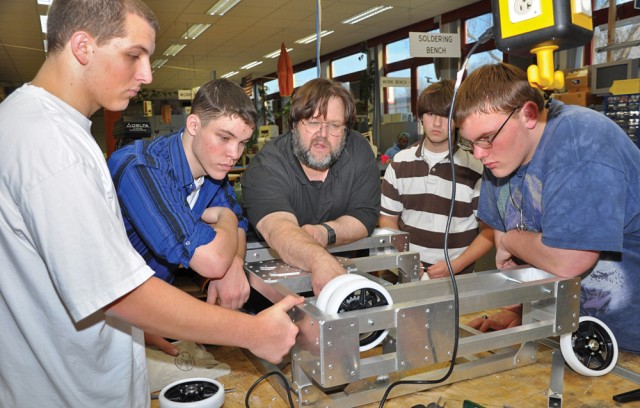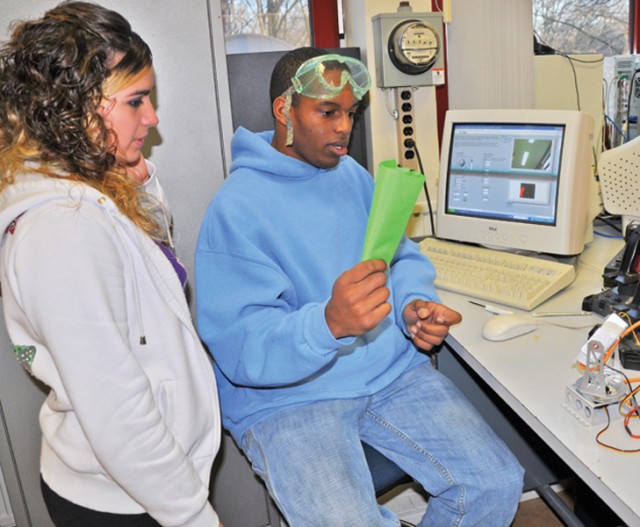WIESBADEN, Germany - Long after most students and teachers have left Wiesbaden High School for the evening, a team of dedicated individuals are hard at work brainstorming and preparing their entry for the 2009 Robotics Contest to be held in Las Vegas, Nev., March 24-29.
"Last year we went as part of the DoDDS-Europe AFNorth team," said Frank Pendzich, team adviser and an instructor in Engineering Technology and Professional Technical Studies. "We built a part of the robot. This year we're going with our own robot."
About 30 students have enlisted in the cause - helping promote, raise funds and perform other vital missions to prepare this year's entry - with some "14 hard-core students working on the robot, case or programming," said Pendzich.
"They've spent hundreds of hours fundraising and working on the robot," he said, explaining that the project nurtures a wide variety of educational skills and objectives such as problem-solving; practical applications of math, science and physics; teamwork; leadership; and quality control. "Engineering, by its definition, is learning to solve problems using math and science."
Various subject matter experts such as engineers from General Motors in RAfA1/4sselsheim, the Corps of Engineers Europe Division and Department of Defense Dependents Schools-Europe Information Technology Division have pitched in to support the Wiesbaden Robotics team.
"One person, one adult, could not do this alone. It takes a team of adults and support from the community and DoDDS-Europe," said Pendzich. "I'm excited and enthralled that they're willing to let us go. ... to give us a chance to display to the world our students' technical prowess."
Members of the team, parents, mentors and others gathered Jan. 3 to share a potluck dinner and view a worldwide webcast of this year's game design. At that time they learned what challenges they faced at the upcoming competition.
"The biggest challenge is time. They only have six weeks to build the robot," he said, explaining that with the many issues that arise while working on a project such as late parts arrival, "in essence it's a real engineering experience."
"It's a little stressful. It's not something you can plan for all year long," said senior Bajon Julien, a veteran from last year's team. "Every year the rules are different - nothing's the same. ... When you get to the competition, you don't know what to expect. You have to work together to win. You get inspiration from the other teams."
Julien, who said he would like to pursue a career in information technology, said the experience gained while working on the project was invaluable. "I'm not only learning about it, I'm programming it as well. The only thing that really limits you is your creativity."
Scott Paul, a team mentor and network administrator for DoDDS-Europe's Information Technology Division, said he appreciated the chance to get involved. "It's a fun project. This is probably the most advanced I've seen, especially at the high school level. This is stuff I was doing in my senior year in college."
Paul added that encouraging young people to pursue technical studies classes at the high school level was important. "We don't have enough technical classes in my opinion to match up to foreign competition. There aren't enough programs and critical thinking."
Projects such as the Robotics contest go a long way toward promoting those skills, he said, adding that U.S. colleges frequently spend the first two years in "getting kids to catch up. If you can teach them at the high school level they'll already have a head start."
"Overall this is a good experience for any kind of engineering," said senior Cody Fischer, another Robotics contest veteran. "It's a good boost for college."
High school junior Gabriela Miranda, who was working on the robot's optical programming with Julien and Paul, said she was excited about the chance to compete in Las Vegas. "This is my first year. Basically I'm learning everything I have to do as a programmer."
"We see this as an opportunity to blaze the trail for other schools interested in expending this much effort to teach engineering," said Pendzich, adding that only two DoDDS-Europe schools will be among the thousands of students competing in Las Vegas.
Not only do students have the opportunity to network with engineers from such prestigious organizations as NASA, they also get the chance to compete for more than $9 million in scholarships, Pendzich said.
It's a true team-building experience, he added, calling it "gracious professionalism. The competition allows teams to compete against one another, but it also encourages them to work together to meet their goals."
The competition was founded more than a decade ago by Dean Kamen, inventor, scientist and head of the For Inspiration and Recognition of Science and Technology organization, to promote future "science and technology heroes."
As students continue to work on the project in preparation for the competition in March, "we welcome the community to come back and see our progress," Pendzich said.




Social Sharing